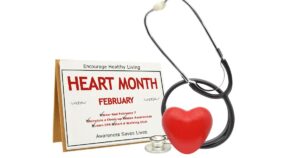February Is American Heart Month
January 30, 2025Approximately 695,000 Americans die from heart disease annually, accounting for roughly every one in four or five deaths. That is just one of the reasons why our country observes American Heart Month each February. While people of all different ages, genders, and backgrounds battle heart disease, there are steps to take to reduce known risk factors and play an active and helpful role in maintaining your heart’s health. On the first day of February, don’t forget it is National Wear Red Day to show your support for raising awareness for heart disease.
of all different ages, genders, and backgrounds battle heart disease, there are steps to take to reduce known risk factors and play an active and helpful role in maintaining your heart’s health. On the first day of February, don’t forget it is National Wear Red Day to show your support for raising awareness for heart disease.
What Is Heart Disease?
Heart disease is the general term for a range of medical conditions that affect the heart, like coronary artery disease (CAD), arrhythmias, congenital heart disease, endocarditis, heart valve disease, heart failure, and more. Some individuals have risk factors that lead to a higher chance of developing heart disease than others, such as physical inactivity, being overweight or obese, smoking, excessive alcohol consumption, and having high blood pressure, high cholesterol, and/or diabetes.
Here are some important facts on heart disease from the Centers for Disease Control and Prevention (CDC):
- In 2022, 702,880 people died from heart disease, or one death every 33 seconds.
- Heart disease is the leading cause of death for women, men, and people of most ethnic and racial groups.
- Coronary artery disease is the most common type of heart disease. It was responsible for killing nearly 372,000 people in 2022.
- That same year, about every one in five deaths from heart disease occurred in individuals under 65 years old.
- An American has a heart attack every 40 seconds. Each year, over 800,000 individuals have a heart attack. Of these, 605,000 are first heart attacks, and the remaining 200,000 occur in individuals with a preexisting history of heart attack.
- Every one in five heart attacks is silent. The person does not know they had it, but the damage has been done to their cardiovascular system.
Luckily, there are steps we can all take to reduce our chances of developing heart disease. Leading a physically active lifestyle, eating a heart-conscious and well-rounded diet with plenty of fruits, vegetables, and healthy fats, having regular check-ups with your physician, keeping an eye on your blood pressure and cholesterol levels, avoiding tobacco products or quitting smoking, and drinking alcohol in moderation are all ways to prioritize your heart’s health.
Warning Signs of Heart Disease
Heart disease is not something that just magically disappears on its own, so it is important that you and your healthcare team stay on top of your condition to ensure you are getting the care that your body needs. Some of the most common signs of heart disease to keep an eye out for include:
- Chest pain is one of the most common signs of heart disease. It typically feels like a sharp pain or pressure that radiates to your neck, jaw, back, and/or arms
- Swelling in your legs, ankles, and feet
- Some people with heart disease sweat excessively, even when they are not active
- Fatigue
- Nausea or vomiting
- Palpitations that feel like a rapid, pounding, or fluttering heartbeat
- Dizziness or feeling lightheaded
- Coughing or wheezing
- Indigestion or heartburn
While there are many different symptoms of heart disease depending on what an individual is experiencing, some instances require emergency medical care. If you suspect that you or someone else is experiencing a heart attack (chest pain, shortness of breath, etc.), call 9-1-1 right away. If you are not having an emergency but have questions about how you can lead a more heart-healthy lifestyle, make an appointment with your doctor today.
When Is it Time to Speak with a Lawyer?
Medical mistakes injure and kill hundreds of thousands of Americans each year, and people trying to seek care for heart disease are no exception. Medical malpractice occurs when a doctor, hospital, or other type of medical provider deviates from the accepted standard of care and it results in injury or death to the patient. Medical mistakes like delayed care or delayed diagnosis, misdiagnosis, surgical errors, anesthesia mistakes, and failure to treat happen the most frequently, leading to entirely preventable – and far too often deadly – errors. If you or a loved one was the victim of a medical mistake, someone at our firm can help. To learn more, contact a representative online now.
Philadelphia Medical Malpractice Lawyers at Galfand Berger, LLP, Representing Injured Victims Since 194
Contact the Philadelphia medical malpractice attorneys at Galfand Berger LLP today. Call us at 800-222-USWA (8792) or fill out our online form for a free consultation. Located in Philadelphia, Bethlehem, Lancaster, and Reading, we serve clients throughout New Jersey and Pennsylvania, including Allentown and Harrisburg.
 Google Screened
Google Screened
